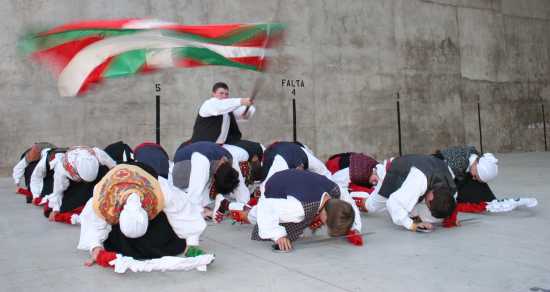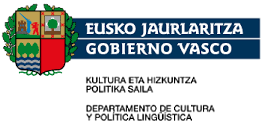Dokumentuaren akzioak
Basques celebrate golden anniversary
This year's Basque picnic held special significance for the roughly 800 Basque residents in the local community, marking the celebration's golden anniversary in Mountain Home.
Originally held in Carl Miller Park, local Basques plan the yearly celebrations around the birthday of St. San Ignacio, the patron saint of Basques.
"We've been going to these for the past 10 years," said Heather Sarria, who came to the festival from Boise along with her family and in-laws. "It's really a fun, small festival. It's a relaxed time for people to get together."
"Today, the weather was perfect," added Paki Sarria as she waited for her granddaughter to perform as part of the evening's entertainment.
Saturday's festival in Basque Park near the city's downtown area follows a larger celebration known as the Jailadi. Held once every five years, the seven-day international event in Boise brings together Basques from around the world.
Richard L. Urquidi, historian for Basques in Mountain Home, remains pleased that the tradition started here in 1961 continues to pass from one generation to the next.
"I didn't think we'd be here 50 years later," Urquidi said regarding the local picnic. During their first celebration, organizers agreed to keep hosting the events as long as people remained interested in coming together for the yearly event.
"The kids took over, and they've done an outstanding job" keeping the Basque culture alive in Mountain Home, Urquidi said. Passed down to the third and fourth generation of Basques in the local area, interest in the picnic waned a couple of times but picked back up as people remained committed to keeping their traditions and customs alive, he said.
"As I look around at people, I'm seeing younger kids playing games," Urquidi said. "They understand our culture, and they're learning our language and alphabet, so the interest is growing in them as well. They'll be here to see another 50 Basque picnics."
The picnic also commemorated the 100th anniversary of the Bengeochea Hotel. The centerpiece of the city's Basque block, the three-story building originally served as a boarding house and cultural center for Basque immigrants. Today, the historic building sees new life after its new owner renovated its interior. Throughout the afternoon, Mirazim Shakoori showcased his building to guests attending the picnic.
Each year, about 120 members from the Euskal Lagunak organization come together to plan and run the festival. These representatives include Basques from Elmore, Owyhee and Ada counties.
This year's festivities began with a traditional Basque feast featuring lamb, rice and red beans. During the evening, they sampled other cuisine like chorizo -- a deep-fried sausage.
On average, people eat more than 500 pounds of the traditional Basque treat during each picnic, said Kelly Mai as she finished cooking a batch.
As a way to pass along the Basque culture to their children, organizers hosted a series of games for the youngsters. The younger children dashed back and forth during the corn race and bounced to the finish line in the sack race while the girls dominated the boys in a tug-of-war.
However, contests like the yearly egg toss proved a bit messy. Contestants like Whitney Sandberg discovered this the hard way as the shattered remnants of raw eggs oozed between her fingers.
Meanwhile, older contestants put their pride on the line during a strongman competition. Geared for teens and adults, it required contestants to haul sets of weights over a preset course with scores set on how far people could tote this weight before dropping them.
In addition to earning cash prizes, winners also walked away with bragging rights until next year's picnic.
"Basques are fun-loving people looking to be together and enjoying our dancing and other ways of life," Urquidi said. "They keep coming for the Basque association, the Basque dancing and the culture and games. It's always been that way."
The evening's entertainment continued during a performance by the Oinkari Dantza Taldea. Based in Boise, the dance group features several people from the local area. They include Itsasne Ibaibarriaga, who joined the team three years ago. A Basque dancer for the past 12 years, she qualified to join the Oinkari team when she was 14 years old.
"I've loved it. It's the only 'sport' that I've done my entire life," she said. "I want to stay in the group as long as I can."
The dances focused on reliving many of the Basque traditions from their native homeland. The Matelota, or fisherman's, dance recalls the days when women would sell fish they carried in woven baskets.
Meanwhile, the Lapurdiko, or stick dance, involves moves where dancers smack together short wooden staffs. Local Basques believe these moves reflect times when people beat sticks together to ward off evil spirits.
The evening's performances culminated with the Ikurriña, or flag dance. The audience applauded and cheered as a member of the dance team waved the Basque flag above other members of the dance troupe who bowed in reverence to their native homeland.
According to members of the dance troupe, the Ikurriña remains an important symbol of the Basque people. For years, this dance was banned in their native country as Spanish dictator Francisco Franco tried to suppress their culture, they said.
Home to one of the world's oldest democracies, the Basques include approximately 3 million people living in a region about the size of Rhode Island nestled between France and Spain.
The first Basques immigrated to the United States around 1860 and became the first people to fish for cod off the Grand Banks of Newfoundland with others settling in places like California. Economic woes in their homeland prompted many more to come to America between 1890 and 1900 with the first Basques coming to Mountain Home around 1910, the Basque historian said. For years, local Basques made their living herding sheep and cows.
More photos available in the Mountain Home News photo gallery

Members of the Oinkari Dantza Taldea dance group showcase theIkurriña, or flag dance, during the 50th annual Basque picnic Saturday afternoon in Mountain Home. The Boise-based dance team culminated a series of cultural events to relive the traditions and heritage brought to America from the Basque homeland in Europe. Hundreds of people from across southern Idaho flocked to Basque Park near the city's downtown area to share in the festival's golden anniversary.
Dokumentuaren akzioak






